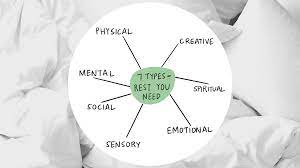How Our Body and Brain Rest and Recover.
Introduction
Sleep is an essential part of human life, as it is the time when the body and brain rest and recover. It is a crucial aspect of our overall health and wellbeing, and inadequate or poor-quality sleep can lead to various health problems, such as obesity, diabetes, and heart disease. In this article, we will delve into the science of sleep, how it works, and how we can optimize our sleep to achieve better health outcomes.
The Sleep Cycle
The sleep cycle consists of four stages: Stage 1, Stage 2, Stage 3, and REM (Rapid Eye Movement) sleep. During Stage 1, we are in a light sleep and can be easily awakened. In Stage 2, the body starts to relax further, and brain activity slows down. During Stage 3, also known as deep sleep, the body repairs itself and regenerates tissue, and the brain consolidates memories. Finally, during REM sleep, the brain is active, and we experience vivid dreams.
The duration of each stage varies, with Stage 1 and 2 accounting for the majority of the sleep cycle, and deep sleep and REM sleep occurring for shorter periods. The sleep cycle repeats throughout the night, with each cycle lasting approximately 90 minutes.
The Importance of Sleep
Sleep is critical for the body and brain to rest and recover, and the benefits of a good night's sleep are numerous. During sleep, the body repairs damaged tissue, produces hormones, and strengthens the immune system. The brain consolidates memories, processes information, and enhances learning.
Moreover, sleep has a significant impact on our physical and mental health. Poor quality sleep can lead to fatigue, irritability, and mood swings, while chronic sleep deprivation can increase the risk of obesity, diabetes, heart disease, and stroke. It can also impair cognitive function, such as memory, attention, and decision-making abilities.
Tips for Better Sleep
Several factors can affect the quality of our sleep, including lifestyle, environment, and habits. Here are some tips for optimizing sleep:
- Stick to a consistent sleep schedule, even on weekends.
- Create a relaxing sleep environment that is cool, dark, and quiet.
- Avoid using electronic devices, such as phones, tablets, or computers, before bedtime.
- Exercise regularly but avoid vigorous exercise close to bedtime.
- Limit caffeine and alcohol intake, particularly in the evening.
- Avoid large meals and sugary or spicy foods before bedtime.
- Practice relaxation techniques, such as meditation or deep breathing exercises.
Conclusion
Sleep is a crucial aspect of our overall health and wellbeing, and optimizing our sleep can have a significant impact on our physical and mental health. Understanding the science of sleep and implementing healthy sleep habits can help us achieve better sleep quality, leading to improved health outcomes and a more fulfilling life.





0 Comments:
Post a Comment
Subscribe to Post Comments [Atom]
<< Home